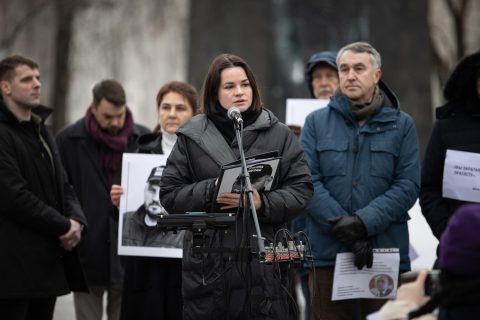Kino Krokodil, Berlin, October 15th, Special Screening
Vulnerability is not typically seen as a strength in politics. To be a leader, conventional wisdom states, one must project capability, willingness, decisiveness.
But Sviatlana Tikhanovskaya, the unlikely leader of the Belarusian opposition, thrust into the spotlight after taking over from her imprisoned husband, is all vulnerability, unwillingness and indecisiveness — caught multiple times with her head in her hands, openly doubting her capabilities to lead Belarus into a fair and free future.
This very vulnerability is what makes The Accidental President (Mike Lerner, Martin Herring, 2024) — from the outset an activist doc — such a fascinating portrait of the resistance leader. Far less polished and media-ready than Alexei Navalny in his eponymous anti-Putin documentary (Daniel Roher, 2022), I’d argue that Tikhanovskaya’s lack of political training is exactly what endears her to be the next democratic leader of the country. This vulnerability, far from her undoing, is actually her biggest asset, a clear rebuke to the macho poison of fascist dictator Victor Lukashenko.
Through a mixture of on-the-ground footage and pulled newsreels, The Accidental President covers the stolen August 2020 election and its brutal aftermath, including the mass imprisonment of protestors and her team’s exile in Vilnius, showing how Tikhanovskaya became so crucial to the nation’s new identity while advocating for more exposure and pressure from the West.
This special screening at Kino Krokodil, organised by the Friedrich Ebert Foundation, and part of Tikhanovskaya’s recent visit to Berlin, culminating in her presence at a post-screening Q&A, highlights the very political and urgent nature of the film, telling the world not to forget Belarus as four years since the stolen election has somehow rolled by.
Constantly at her side, both in the film and at the screening, is Franak Viačorka, journalist and activist turned chief political advisor, whose steadfastness and political-savvy are the perfect antidote to her confusion, resulting in a gripping moment as she struggles to react to Russia’s invasion of Ukraine with the support of Belarusian military bases and airspace. History unfolds in real-time, consolidating the dreadful news of the past years into an urgent plea for change. Viačorka and Tikhanovskaya’s relationship forms the heart of the film, an unlikely clash of personalities that may potentially change a nation. Seeing that dynamic play out on screen is deeply intriguing.
But where The Accidental President benefits from its unfettered access to its subjects, accompanying her from Warsaw to the White House, it creaks under the weight of a self-evidently low budget, from the unfocused introduction to a lack of compelling structure.
Most noticeable is the misuse of journalistic safety basics. As mentioned in the beginning, protestors’ faces are ostensibly concealed to prevent their identification by the authorities. It’s a noteworthy aim, yet instead of (perhaps painstakingly) blurring out each individual’s face, a crude blurry bar is drawn over the entire row of protestors, with some faces still clearly visible. Not only does this look distracting, it ends up simply failing to keep these people safe.
But in other aspects, this low budget feels apposite for the Tikhanovskaya project, a bare-bones albeit tech-savvy outfit vainly competing against the full state machinery of the Lukashenka regime. It even becomes a strength in the way the filmmakers become part of the wallpaper at their Vilnius office, able to capture intimate moments between Tikhanovskaya and her team, ranging from the humorous (“Am I on Twitter?” “You have 15,000 followers”) to the truly heartbreaking, Tikhanovskaya openly asking if she can just give it all up.
It’s here The Accidental President becomes a piece of history, capturing those human moments of introspection that are the hallmark of a truly great leader. With so many charlatans around the world who take pleasure in pretending to know exactly what they’re doing, only to lead us to ruin, Tikhanovskaya’s genuine uncertainty is deeply refreshing.

Redmond is the editor-in-chief of Journey Into Cinema.




